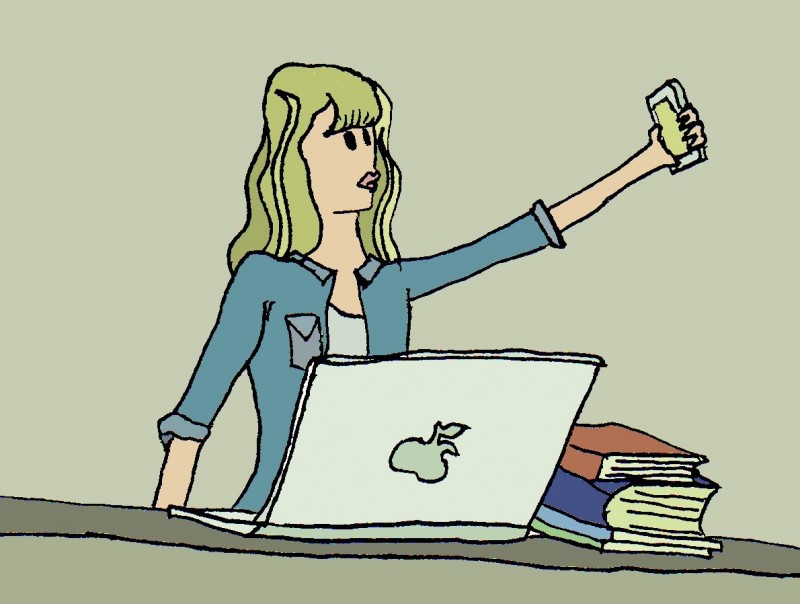Ellen Finn | Contributing Writer
Let’s get one thing straight – Snapchat is not your friend. However friendly that little white ghost may seem, it is as addictive and alluring as its infamous blue cousin.
We all remember when ‘texting’ someone was (and possibly still is) a tangible and necessary precursor to any further romantic or platonic relationship. Yet with the advent of the era of smartphones, the traditional SMS has been relegated to the bottom of the communications pyramid, superseded by the timed image-sharing app.
In effect, the makers of Snapchat have capitalised on a worrying characteristic of our generation – the reluctance and extreme aversion to commitment.
Where texting was a stage removed, both verbally and emotionally, from actually picking up the phone and calling someone, so is Snapchat further distancing the sender and receiver. Composed messages intended for specific recipients are replaced by fleeting glimpses of an image potentially shared with an entire address book, encouraging the constant paranoia that you’ve been a victim of ‘serial-snapping’ and that up-close coy selfie wasn’t meant solely for your consumption.
In effect, the makers of Snapchat have capitalised on a worrying characteristic of our generation – the reluctance and extreme aversion to commitment. If Snapchat is the new texting, it is a debased version, a means of communication that allows us to avoid committing to a message, image, hashtag or otherwise, for a period longer than that specifically chosen by us.
Whilst you might save the holiday snaps for a wittily-titled album on Facebook, or the amusing anecdote for Twitter, ‘snapping’ someone does not necessarily mean that you have anything of importance, or anything at all, to express. Whether the popular ‘study #fml’ snap or the drunken selfies, the overwhelming success of Snapchat heralds a continuation of the trend started by social media – the relentless and compulsive documentation of the mundane.
Yet, I’m addicted.
It’s not just the endless creeping possibilities enabled by the (often misleading) ‘best friend’ listings, or the simultaneously feared and revered high Snapchat score, it’s the sheer simplicity of it. You feel happy, you take a picture of yourself with an exaggerated happy face, send it to friends to let them know you’re feeling so ah-mazing. It’s fun, it’s quick and it offers instantaneous reward.
But is this simplicity just a manifestation of our increasing literary laziness? Nevermind the atrocities of ‘text speak’, the majority of us now express our current emotions, activities and thoughts by capturing a skewed and often staged visual, rather than exerting ourselves on some kind of basic literary or verbal description.
One simple Google search is enough to confirm all paranoia-induced fears about the ultimate destination of your private snap.
Almost inevitably with anything online, with use comes abuse – it’s only when you download Snapchat do you curse the near-inhuman dexterity of your so-called friends. Screenshots have become the norm, especially for people naïve enough to show their nearest and dearest their best ‘ugly face’ for more than five seconds. Seemingly, it’s against our nature to embrace the original spirit and intent of the friendly phantom; we’re already programmed to save, store and upload. Indeed, with the increasing number of ‘Snapped at…’ pages on Facebook, it’s not surprising that the social media monster have offered Snapchat execs an alleged $3 billion for use of the mobile messaging app.
To cite one of the favourite parental clichés, once something is on the ‘net, it never disappears in the way Casper’s edgy cousin might have us believe. One simple Google search is enough to confirm all paranoia-induced fears about the ultimate destination of your private snaps, with conspiracies rife that the fleeting images are stored locally on devices, rather than deleted completely. However, it seems that the potential threat of publication does very little to deter the Snapchat following with a penchant for exhibitionism, with the fully or partial nude 1-second snap remaining a firm drunken favourite.
Snapchat addiction is on the rise. Soon the realisation that things, events and emotions still matter even if you haven’t sent everyone in your address book a captioned and slightly out-of-focus Snapchat of them, will come all too late.
We’ve got to get out now, put down the phones and start taking mental screenshots of what’s going on around us – I promise you, they’ll last more than ten seconds.
Illustration by Stephen Lehane







